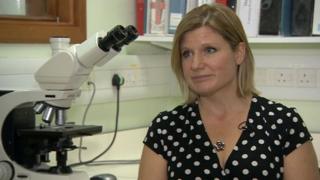
Dr Osborne said clinical research was a vital part of the NHS
New research could see patients with a rare blood cancer live longer without the side-effects of drugs, doctors say.
Chronic myeloid leukaemia (CML) patients are often required to take tyrosine kinase inhibitors (TKIs) indefinitely.
But 93% of those in a new study stayed cancer-free after stopping or reducing treatment.
Cancer Research UK said the results were “promising” but dosages should not be changed without a doctor’s advice.
In 2000, trials of TKIs proved successful in controlling the rare disease, but also had side-effects, including an increased risk of infection, skin rashes, nausea, hair loss and in some cases hormone disorder and a build of fluid around the heart.
The follow-up study, led by the University of Liverpool and involving consultants from Newcastle’s Freeman Hospital, saw patients being given half the standard dose for the first 12 months. If leukaemia levels remained low, the drug was then stopped completely.
So far, out of 174 patients tested, 93% have shown no evidence of their leukaemia relapsing one year after reducing their dosage and many reported a significant decrease in side-effects within the first three months.
About chronic myeloid leukaemia
- Chronic myeloid leukaemia is a cancer of the bone marrow which causes it to make too many white blood cells
- CML may affect people of any age and of either sex, but is uncommon in children younger than 10
- Drugs developed in the late 1990s called tyrosine kinase inhibitors (TKIs) were responsible for revolutionising treatment for CML
- Although CML is genetic at its root, it is not inherited from parents nor is it passed on to children
- Because many patients are advised to stay on TKIs indefinitely, researchers have been testing whether it is feasible to discontinue their use
- Since 2008 people diagnosed with CML have about a 70% chance of surviving more than 5 years
Dr Wendy Osborne, who is leading the Destiny study in Newcastle, said: ‘We’ve gone from having patients with a potentially incurable disease and requiring toxic chemotherapy and transplantation, to now selecting some patients, again in a clinical trial setting, to stop the drug completely to remove any side-effects they have.
“This in itself is moving towards saying we’ve cured some patients and this is all because of research.”
Dr Áine McCarthy, senior science communications officer at Cancer Research UK, said: “The promising results of this trial show that some patients with CML can safely stop their treatment and their cancer does not come back.
“But it’s extremely important to remember that these patients were involved in a clinical trial meaning they stopped treatment under controlled, supervised conditions.
“All patients who took part were selected because their disease was at low risk of coming back, and they had been having treatment for at least three years. If you or someone you know is being treated for CML, it’s important they make no changes to their treatment unless advised to by their doctor.”
Margaret Edgar was patient 001 in the 2000 trial
Margaret Edgar, from Ferryhill in County Durham, was the first patient to sign up for the initial drugs trial in 2000 after being diagnosed and told she only had a maximum of four years to live.
Seventeen years later she is cancer free.
She said: “At the time I didn’t think that I would be cured, but neither did I think I’d be here 17 years later.
“The trial back in 2000 was really my only hope at the time.”
The Destiny trial is to end in March 2018. Dr Osborne said there were no plans to extend the project as its data was complemented by French and Canadian research.
Newcastle researchers welcome CML leukaemia trial success

